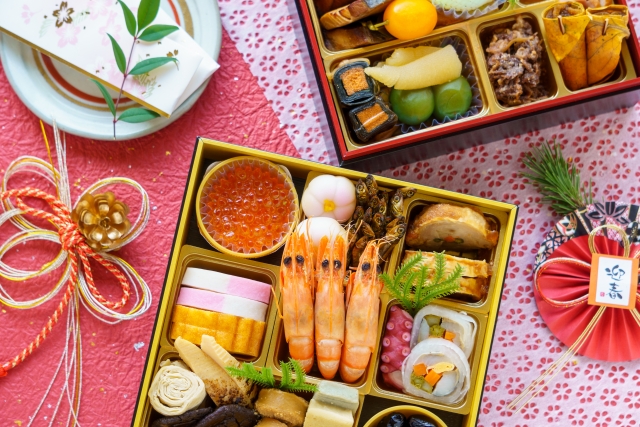
今回のニュースレターでは、日本の新年を彩る伝統や文化についてご紹介します。日本のお正月といえば、家族で過ごす特別な時間、美味しいおせち料理、神社への初詣など、さまざまな風習が思い浮かびます。これらの行事にはどのような意味が込められているのか、一緒に探ってみましょう。
おせち料理:一年の健康と幸せを願って
おせち料理は、お正月の象徴ともいえる料理です。それぞれの食材には意味が込められており、例えば黒豆は「まめに働き、健康であるように」、昆布巻きは「喜ぶ」、数の子は「子孫繁栄」を象徴しています。家族でこれを囲むことで、新しい一年の平和と繁栄を願います。
初詣:新年の祈願と感謝
お正月には神社やお寺を訪れる「初詣」が欠かせません。一年の感謝を伝え、新たな年の平安と幸せを祈ります。多くの人が、地元の神社や有名な神社へ足を運び、おみくじを引いたり、絵馬に願い事を書いたりします。神聖な空気の中で新たな決意を固めるにはぴったりの行事です。
お正月飾り:家に福を迎える準備
門松やしめ飾り、鏡餅といったお正月飾りも重要な役割を果たします。これらは歳神様をお迎えするための準備とされ、新しい年の幸福や繁栄を祈るシンボルです。現代では簡素化されることが多いですが、心を込めて飾り付けることで特別な気持ちを持つことができます。
年賀状:人とのつながりを再確認
お正月といえば、やはり年賀状を忘れてはいけません。SNSが普及する現代でも、日本では年賀状を送る文化が根強く残っています。新年の挨拶を通じて、日頃なかなか会えない人との絆を再確認する大切な習慣です。
日本のお正月には、古くから続く伝統と文化が詰まっています。それぞれの行事や風習には、家族や友人、そして新しい年への感謝や願いが込められています。今年のお正月には、ぜひ日本の伝統を体験してみてください! それでは、良いお年をお迎えください!
おせち料理:一年の健康と幸せを願って
おせち料理は、お正月の象徴ともいえる料理です。それぞれの食材には意味が込められており、例えば黒豆は「まめに働き、健康であるように」、昆布巻きは「喜ぶ」、数の子は「子孫繁栄」を象徴しています。家族でこれを囲むことで、新しい一年の平和と繁栄を願います。
初詣:新年の祈願と感謝
お正月には神社やお寺を訪れる「初詣」が欠かせません。一年の感謝を伝え、新たな年の平安と幸せを祈ります。多くの人が、地元の神社や有名な神社へ足を運び、おみくじを引いたり、絵馬に願い事を書いたりします。神聖な空気の中で新たな決意を固めるにはぴったりの行事です。
お正月飾り:家に福を迎える準備
門松やしめ飾り、鏡餅といったお正月飾りも重要な役割を果たします。これらは歳神様をお迎えするための準備とされ、新しい年の幸福や繁栄を祈るシンボルです。現代では簡素化されることが多いですが、心を込めて飾り付けることで特別な気持ちを持つことができます。
年賀状:人とのつながりを再確認
お正月といえば、やはり年賀状を忘れてはいけません。SNSが普及する現代でも、日本では年賀状を送る文化が根強く残っています。新年の挨拶を通じて、日頃なかなか会えない人との絆を再確認する大切な習慣です。
日本のお正月には、古くから続く伝統と文化が詰まっています。それぞれの行事や風習には、家族や友人、そして新しい年への感謝や願いが込められています。今年のお正月には、ぜひ日本の伝統を体験してみてください! それでは、良いお年をお迎えください!
Japanese New Year
In this newsletter, we would like to introduce the traditions and culture that color the New Year in Japan. When we think of the Japanese New Year, various customs come to mind, like special family time, delicious Osechi cuisine, and Hatsumode (visits to shrines on New Year’s). Let’s explore these events together.
Osechi Cuisine: Wishing For a Year of Health and Happiness in the New Year
Osechi is a symbolic dish of the New Year. For example, black beans symbolize “working diligently and staying healthy,” kelp rolls represent “joy,” and herring roe signifies “prosperity of descendants.” Surrounding them with family members is a way of wishing for peace and prosperity in the new year.
Osechi is a symbolic dish of the New Year. For example, black beans symbolize “working diligently and staying healthy,” kelp rolls represent “joy,” and herring roe signifies “prosperity of descendants.” Surrounding them with family members is a way of wishing for peace and prosperity in the new year.
Hatsumode: Prayers and Gratitude for the New Year
Hatsumode, or New Year's visit to shrines and temples, is essential to the New Year celebrations. It’s a time to express gratitude for the past year and pray for peace and happiness in the new year. Many people visit local shrines and famous shrines to draw omikuji (fortune slips) and write their wishes on ema (small wooden plaques). This is the perfect event to make new resolutions in the sacred air.
Hatsumode, or New Year's visit to shrines and temples, is essential to the New Year celebrations. It’s a time to express gratitude for the past year and pray for peace and happiness in the new year. Many people visit local shrines and famous shrines to draw omikuji (fortune slips) and write their wishes on ema (small wooden plaques). This is the perfect event to make new resolutions in the sacred air.
New Year's Decorations: Preparing to Welcome Good Fortune Into the Home
New Year's decorations such as kadomatsu (pine decorations), shimekazari (sacred straw decorations), and kagamimochi (mirror-shaped rice cakes) also play an important role in this event. These are symbols of preparation for welcoming the god of the year and praying for happiness and prosperity in the new year. Although they’re often simplified in modern times, with care allows us to cultivate special feelings for the occasion.
New Year's decorations such as kadomatsu (pine decorations), shimekazari (sacred straw decorations), and kagamimochi (mirror-shaped rice cakes) also play an important role in this event. These are symbols of preparation for welcoming the god of the year and praying for happiness and prosperity in the new year. Although they’re often simplified in modern times, with care allows us to cultivate special feelings for the occasion.
New Year's Greeting Cards: Reaffirming Connections with People
Speaking of New Year's, we must not forget the New Year's greeting cards, which people still send in Japan even in today's age of social media. It is an important custom to reaffirm ties with people you cannot easily see daily through New Year's greetings.
Speaking of New Year's, we must not forget the New Year's greeting cards, which people still send in Japan even in today's age of social media. It is an important custom to reaffirm ties with people you cannot easily see daily through New Year's greetings.
The Japanese New Year is filled with traditions and culture that have continued since ancient times. Each event and custom is filled with gratitude and wishes for family, friends, and the new year. We hope you will experience Japanese traditions this New Year's! Have a happy New Year!
sign up for the Japanese-Online Newsletter
__..-・**・-..__..-・**・-.._ あいうえお かきくけこ さしすせそ たちつてと なにぬねの はひふへほ まみむめも やいゆえよ らりるれろ わゐうゑを ん __..-・**・-..__..-・**・-.._
#JapaneseOnline #LearningJapanese #FreeJapaneseLessons #JapaneseVideoLearning #JapaneseAnime #Anime #JapaneseFood #Bloguru
